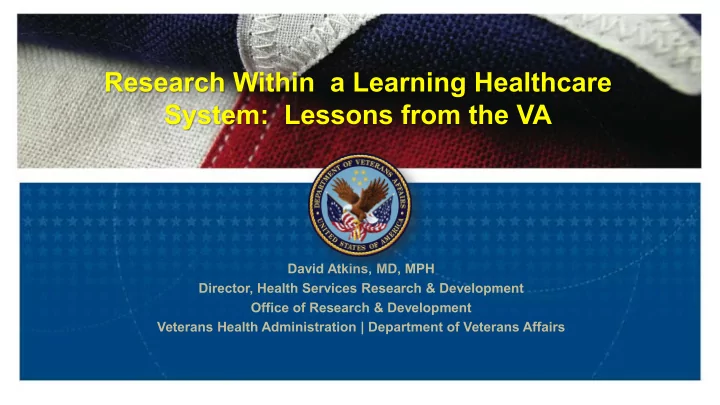

Research Within a Learning Healthcare System: Lessons from the VA David Atkins, MD, MPH Director, Health Services Research & Development Office of Research & Development Veterans Health Administration | Department of Veterans Affairs
The Nation’s Largest Integrated Health Care System • In FY 2018, more than 9 million Veterans were enrolled in VHA • VA provided care at 1,250 health care facilities, including: – 172 VA medical centers – 1,069 outpatient facilities of varying complexity 2
Unique Advantages of VA for HSR • Dedicated research appropriation for research – $ 722 Million in 2019; Can study T1-T4 translation – $20 million for QUERI program to implement research • 20+ years of EHR data in national corporate data warehouse • Integrated care system with social, educational, housing and disability services – Commitment to caregivers • Patients committed to helping fellow Veterans 3
Need to Distinguish 3 Distinct Questions • Knowledge Questions – WHAT should we do? – How should we taper opioids in Veterans taking high- dose therapy? • Implementation Questions – HOW should we do it? – What is best way to train and promote delivery of buprenorphine for patients with opioid dependence? • Execution Questions – HOW can we promote consistent high-quality care? – How do we improve poor-performing sites for substance use disorder? 4
PROBLEM: Too Little of our Research Achieves “Liftoff” (Gets Into Widespread Practice) • Majority of successful interventions never get adopted at new sites – Many don’t even get sustained at original site • Not aligned with top system priorities • Researchers often don’t understand “value proposition” of customer 5
Reasons Your Research Might Not Make A Difference • It takes too long • Your incentives aren’t aligned with those of leaders • You haven’t planned for implementation at the beginning 6
4 Possible Solutions • New funding mechanisms • New models for research: health system partnerships • New incentives for impact • Enhanced attention to implementation 7
Why Engage Veterans in VA Research? • Engagement initiative began in 2015, informed by work of PCORI • Ensure we ask useful, meaningful research questions that can improve VA health services • Improve the quality and relevance of data collection instruments • Strengthen understanding of our data and the population(s) we hope to help • Speed dissemination and uptake of innovations to Veterans and those who care for them
Levels of Engagement in Research Participate Consult Involve Collaborate Lead/ Co-Lead Veteran’s Role To act as a To provide feedback To work directly with Partner with Leadership role with participant in a or input on specific a research team researchers on all decision-making research study research activities throughout a study aspects of a authority on studies research study Researcher’s To conduct research Veteran(s) asked for On-going Research teams Shared leadership in a respectful, input on specific engagement of expanded to include and decision- Role ethical manner aspects of a research Veteran(s) Veterans; provide making study throughout a training as needed research study Examples Quantitative, Meeting with existing Standing group Veteran(s) join Veterans are qualitative, mixed or ad hoc groups; dedicated to research team and research partners or methods research priority setting providing input on act as team co-investigators activities studies member
10 Engagement Meetings Clockwise from top: Houston, Iowa City, Denver VAMCs
What are we still learning ? • Including different perspectives requires a culture shift • Need new ways to measure impact of Veteran Engagement in Research • Need to navigate administrative barriers to training and compensating Veterans who contribute • Exploring how to engage Veterans more fully as co-investigators, reviewers 11
Observations on the PCORI Projects • Caregivers are a critical focus for research and delivery system • Engaging Veterans in PTSD research is critical –Adherence to proven treatments is poor –Recruitment into research is challenging • Comparative effectiveness research using CDW –Not able to conduct trials on all treatments 12
Conclusions • Research is critical to a Learning Healthcare System but needs to evolve to meet the needs of decision makers • Engagement of stakeholders is critical to that evolution. • Need to learn from real-world data and natural experiments • Need to plan for implementation at beginning of any intervention study – understand perspectives of patients and clinicians • Relationships (bi-directional) are more important than evidence. 13
Why Can It Be Hard for Research to Get Traction in a Large Learning Healthcare System • Heterogeneous clinical environments • Dispersed decision making • Management silos • Politics reactive decision making • Need to identify where leaders are willing to act on new or better information – “decisional equipoise” • Requires ongoing engagement with all stakeholders – Patients, clinicians, and leadership 14
15
Past and On-going Veteran Engagement activities in VA Research Veteran Jam sessions on Veteran Cyberseminar Engagement Tool Engagement Engagement series kit (SERVE) Workgroup Research Center Level Engagement activities (e.g. Veteran Community Advisory Board, COIN Steering Committee) Individual VA research projects that engage Veterans and VSOs (planning, implementation, & dissemination) 16
3 Limitations of Our Research Structure 17
Recommend
More recommend